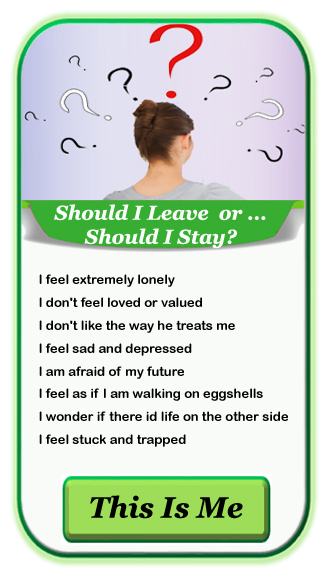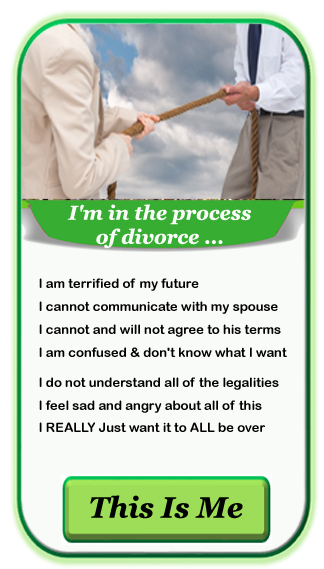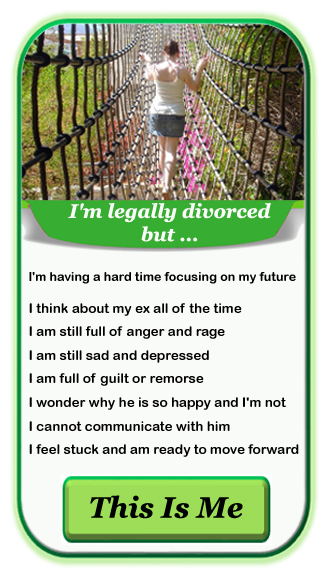From the outside looking in, it may appear that a person decides to get divorced, goes through the legal process and then it’s over. There is so much more to the divorce process than this. There are seven stages that you go through. It’s important to realize that these phases may overlap and may not come in the order specified below. Even though some stages are more painful than others, know that it is possible to experience peace through ALL stages of divorce.
The Seven Stages of Divorce
Cognitive
This is the thinking stage. You will be contemplating divorce. You will wonder if it is the right thing to do. A person can remain in this stage for years. It’s very scary to decide to leave the life that you have known behind. Your thoughts circle around thousands of questions such as:
- Will anyone ever love me again?
- Will I be alone for the rest of my life?
- Will I be happy?
- How will I support myself?
- How will the kids handle it?
- Who will care for me if I get sick or when I’m old?
- Will I become a bag lady?
On the other hand if your partner is contemplating divorce you may be in complete denial. You are merrily going along in your life and BAM he says he’s leaving you. This sets in motion a barrage of fearful thoughts that are very similar to the questions above. After you have healed, you will more than likely be able to look back and see the warning signs.
Spiritual
The spiritual divorce may begin during the cognitive stage. Depending upon your personal spiritual beliefs, you may feel as if divorce is the ultimate worst sin. You may be concerned about what other people will think and how your church will treat you as a person. You may blame God wondering how he could allow this to happen to you. Along with the spiritual beliefs there may also be ethnic issues to consider. This can be very scary and may lead many women to remain in unhappy marriages.
During the spiritual divorce, you come to terms with who you are as a person. You learn from the past and embrace all of yourself. You have a strong sense of belonging and love that comes from a power far greater than yourself which often leads to an inner-peace.
Emotional
The emotional divorce is letting go of your need to either care for or being taken care of by your spouse. This can be something as simple as having your ex on speed dial because he is the first person you call if your car break downs, you have a plumbing issue or you need help cleaning the garage. You may not be living with him and might even be legally divorced, yet you cling to him and treat him as if he is still your husband.
Some women give their ex’s keys to their home and allows him to come and go as he pleases. She usually tells herself that it is better for the kids. Effective co-parenting does not rely on parents being best friends. In reality you may be doing yourself a disservice. By holding onto the emotional ties, you are not allowing yourself the freedom to heal and move on with your life which may lead to a new love.
Physical
The physical divorce not only means one of you moving out of the house. The physical divorce may begin months or years prior when the two of you quit having sexual relations or one of you moved out of the master bedroom. Women often report that they did not sleep with their husband for years before one or both of them accepted the fact that divorce was inevitable.
Legal
The legal divorce is that little piece of paper that states you are now an unmarried person. The length of this stage will vary depending upon numerous factors including where you live, and if the two of you agree on the division of property and income. It will set forth parenting time and child-support. A woman has the option of returning to her maiden name once the divorce is final. The name change can be completed through the divorce by checking a box on the initial paperwork.
The legal aspect may include attorneys, mediators, certified divorce financial analysts, real-estate brokers, and counselors.
Healing
Everyone experiences some sort of emotional upheaval before, during and sometimes after a divorce. Breaking the emotional ties can be very difficult and you may feel as if you are on a wild wacky roller coaster ride that never seems to end.
The emotional ups and downs often comes because you are grieving the loss of your marriage, your hopes and your dreams. The five stages of grief are denial, anger and resentment, bargaining, depression and acceptance. Grieving is a painful experience that each woman must go through in order to let go of her past. Grieving brings closure.
Moving On
This phase includes acceptance. You may have accepted your divorce long ago, but until you complete all of the stages you may not feel the freedom to create or pursue your dreams, simply because you have been busy in the divorce or healing process.
You have learned the lessons you were meant to learn, both from your marriage and divorce. You may not completely know what you want, but you definitely know what you don’t want.
You are living your life as a single woman. You may relish the single life or be ready to get out there and start dating again. The choice is yours. You can create whatever type of life you desire for yourself.



Leave a Reply